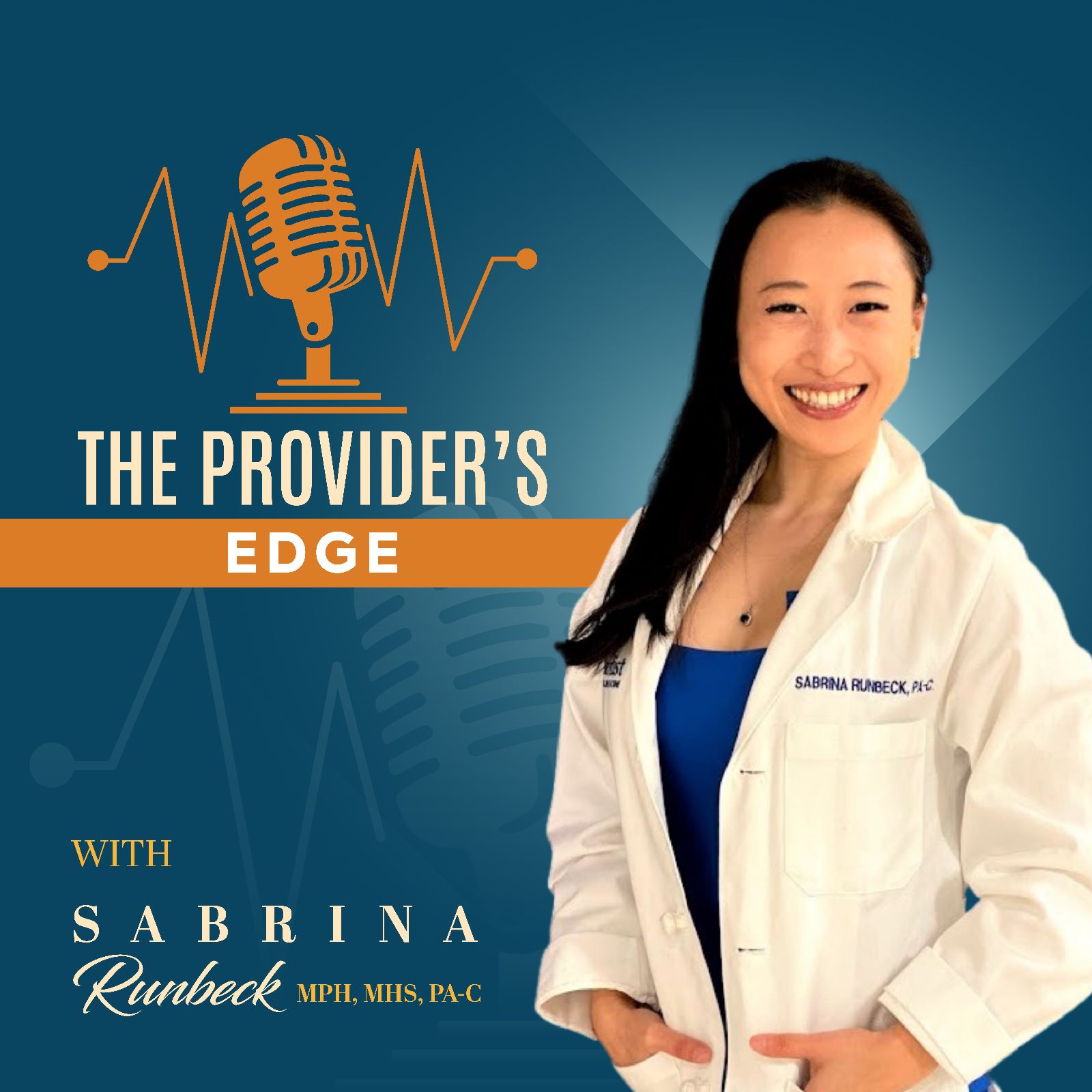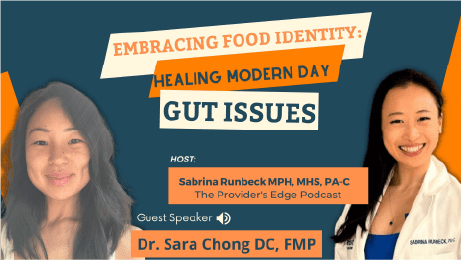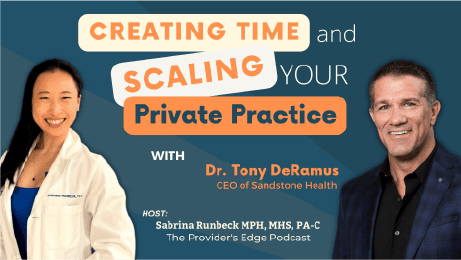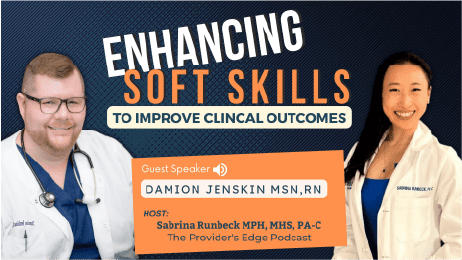
4 Influential Nutritional Factors
Providers Must Demonstrate To Ensure Disease Prevention
Nutrition is health.This medical specialty is based on the complex analysis of the food we consume as human beings.In this episode, we discuss 4 influential factors that highlight the importance of nutrition education to motivate people to lead a healthy life and prevent diseases by obtaining the best resources according to the needs of each patient.You can make changes to teach healthy eating.Start now to take the first step to help improve the lives of many people with your professional practice.Our feature guest today is Kelly Springer MS, RD, CDN, a professional nutritionist founder, and owner of Kelly's Choice, a comprehensive nutrition and health company offering private nutritional counseling, workplace wellness, educational webinars, and media appearances, and brand partnerships.She shared the importance of staying current on the latest research in biochemistry and nutrition to teach patients in an easy and understandable way how to eat healthy to promote health and wellness.Subscribe ? and listen ?to this episode now❗To connect with Kelly find her links below:https://www.instagram.com/kellyschoice_nutrition/ Thank you again for joining us today!We love to hear your feedback. Send me your stories or question here: SabrinaRunbeck.com/Connect We are here to support you, so let us know how we can further uplevel your success!
Listen anywhere you get your podcastin' on.
Live Interview

Show Summary
Eating is one of life's pleasures!We eat food for JOY not only for nutrition. Food is also a big part of our culture. Yet, how many of you in healthcare are rushing to get to the next patient's appointment, squeezing another patient into your already packed day, and rushing to complete your notes before realizing that you have not eaten all day? You then shorten your mealtime. A half-hour break turns into shoving food in your mouth in five minutes. At the end of the day when you finally come home, do you contemplate what you want to cook for your family and yourself? You might just grab whatever is available in your refrigerator to heat up or get take-out delivered from a local restaurant. Does food then become a burden? At this point, have you considered what you are putting into your body? Are you recharging your body or depleting it? Do you really know what nutrition means to your and your patient’s health?
Leveraging Your Resources to Accelerate Together
Medicine, in general, is practiced with a synchronized team. Someone is always the primary attending in both private and hospital settings to oversee and coordinate care. However, we each play a different role and that's why we have medical subspecialties and holistic practices. This way, we can serve our patients from different angles that complement each other. Nutritional health, for example, is a constantly growing and changing field like the rest of medicine. This domain has been strongly associated with our metabolic health and disease expression. In the last five years, more research and recommendations have surfaced to the general public. As providers, we can further help our patients from both preventative and disease management perspectives to constantly learn more, and then appropriately create content for patient education. This is also important to combat misinformation in the open market. When treating patients as a whole, we understand that nutrition education is an important file to focus on. Yet, our training years have little nutritional education for providers in medicine. They are better covered in functional medicine and ayurvedic medicine. Besides the nutritionists who devoted themselves to this field, we have seen that people have not really been well educated by their providers. Therefore, providers should get to know the nutritionists in their community so they can refer patients to these experts. You don’t have to be an expert in every field. Patients and colleagues come to you because you are the expert in your field. A referral to the right colleague can save you time and energy when talking about these in-depth topics with your patients. Nevertheless, you should still have a general idea of the updated recommendations. Reaching out to nutritionists to have that conversation today. Not only does this allows you to be more knowledgeable in preventative medicine, but also uses these opportunities to build referral partnerships. This is why I invited one of my friends, Kelly Springer MS, RD, CDN, a professional nutritionist and founder of Kelly's Choice (https://www.kellyschoice.org/). Kelly’s choice is a workplace wellness platform that could serve any medical professional, so they can learn through video content, newsletters, and blogs, it's so easy, and there's also an app. Kelly is an active speaker who has been featured on Good Morning America.
Be a Role Model for Healthy Living
We all eat on a daily basis, so we assume we know what we're doing. Do you eat only because you're hungry? Let’s use the analogy of driving a car. For those of us who have to drive a car to work, we passed our driving test and build experience on how to get from point A to point B. However, most people don’t know how to perform their own car maintenance. A survey conducted by Cooper Tires discovered that nearly half of the American car owners aren’t confident they’d be able to change their car’s oil. The reality is we don't know anything about the mechanics of the car. We, therefore, also won’t know everything required to generate energy and heal our bodies. When healthcare providers work with patients, we need to be conscious that both ourselves and our patients are not educated enough on how to eat properly. We learn from observation. A study conducted by Columbia University showed that 51% of primary care physicians are overweight or obese, and they found that patients feel misunderstood and judged by these primary care physicians who are also overweight or obese. They felt that they are not being educated on the importance of exercise and nutrition as much as other physicians. Have you heard about mirror neurons? A mirror neuron will fire one observes the actions performed by another person. This means the behavior of the other is seen as though the observers themselves are acting. What does this mean to your patients? Even when we don’t think people are watching they are. As healthcare providers, you have to set a good example. Optimize your own health so your patients and those close to you would follow in your footsteps. May I ask you, how are you applying your medical knowledge to your own health? Are you teaching your patients about preventative care? What measures have you taken to make sure you are optimizing your nutritional health? Your patients are always watching what you do because they are seeing you as an authority. They are seeking guidance that’s why they are coming to you. When you are congruent to who you are, what you do, and what you say, then you are setting an example for everyone else in your circle. What is one habit you can adopt into your life right now?
Combat Misinformation with The Right Resources
Currently, there is a lot of misinformation on the Internet regarding nutritional health. Many influential people on social networks spread harmful information. Healthcare providers play an essential role in disseminating the right educational content to keep patients on the right track. Weight loss is a billion-dollar industry. People with high hope and lack of patience do bizarre detox diets and get sucked into scammers. Poking holes in these unvalidated diet plans are not the best way to combat false information. A scarcity mindset continuously places those who speak the words and those who listen in a lacking state. Words have powers. Instead, we should focus on what is achievable. Believe that patients can find a way that is best suited for their body type, physical fitness needs, and energy expenditures. There is a lot of work to be done as an individual. At the same time, the public as a whole can be better supported by policy change to assist in how to view food and guide our choices. In the U.S., Fast food restaurants have already been putting calorie counts on the menu since New York City adopted them in 2006. After several court challenges, the law was implemented in 2008 for all chain restaurant menus and menu boards. If we can implement the same concept in every restaurant, then the public will have more information to make the right decision. Not only making decisions allured by their eyes and emotions, but also with their sage brain. At the end of the day, we can only provide as much positive and truthful information to our patients. Once awareness is present, then the power is on the patients themselves to gain benefits and accept absolute responsibility for themselves.
Practicing Preventative Medicine NOT Defensive Medicine
Today, the relationship between food and gut health has taken a significant impact on people's lives. Nutrition changes the way we feel by changing the way our body chemistries work. Some patients may have an overgrowth of bacteria in their intestines. These bacteria accumulate over time due to exposure to different toxins, foods, or antibiotics. Perhaps you believe you might not be one of the few who would suffer from these exposures. You have better genes. Certainly, you might be right. We cannot control which gene might be expressed, but we can reduce inflammatory changes. In the early months of the pandemic, people were in disbelief. As the reality hit home, the public mentality split into doing everything to protect one’s self versus vaccinations are lies. Those healthcare professionals, especially the providers working in hospital settings, have seen many unvaccinated patients being intubated and even passing away. People who had multiple boosters shots can still contract COVID19. Whatever you believe is the right belief for you. Changing someone’s belief is difficult. However, we can help to modify their attitude and their individual actions. Preventative medicine is always cheaper for the patients and holds less burden on the overall healthcare cost. Physicians argue that defensive medicine is a significant driver of health care cost inflation. Nevertheless, Chronic disease management is one of the biggest burdens in the American Healthcare system. We can better prevent chronic disease manifestation by providing early education. Building habits at any stage of life are based on 3 factors: Trigger, Action, and Desire. This is the type of personalized medicine that you can go over with your patients to modify behavior changes. If you're not healthy, if you don't know what to eat, your gut is going to hit and be so mad at you, that you feel a lack of energy. Now, how can you be productive, how can you have the best sharp, focused mind to create all those meetings, things that you want to create in life, however, to support the people that you want to support? So all the people who are in your management of the private practice, on the right, or in a large organization, not only need to know nutrition better, so you should share that information with your patients, but your individual team members should also have those tools. So would you like to learn a little bit more about those things? The goal is real people promoting real food, pushing at this time to get more and more health professionals educated because nutrition education will trickle down to the patient, and they will definitely feel stronger in their beliefs of being able to live healthily.
Recommended Podcast Episodes
Ep 55
Embracing Food Identify:Healing modern-day gut issues through traditional healing foods with Dr Sara
Be a guest on our show
Healthcare Entrepreneurs!
I can help you accelerate your social mission and increase profitability by gaining visibility and credibility in the right circle of influence.After overcoming burnout working in surgery, I went back to my roots in neuroscience and public health. I learned the importance of building key human relationships with her team throughout her organization.I did it by combining her expertise in hosting a highly-ranked podcast with speaking at various global healthcare conferences and TV channels. I found the best way to create long-lasting business growth in healthcare is through connecting with the right circle of influence.I discovered that visibility is the gateway to profitability.My clients no longer worry about where their next client is coming from, the need to plan additional budget for ads spend, or lose the ability to connect with others because their social media account is shut down.If you want to share your social mission with the world and gain endless supporters that become loyal clients... then you are in the right place, with the right advisor who is also a recovered clinician.




